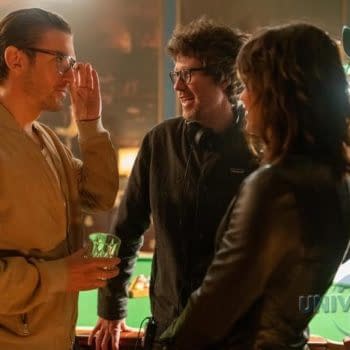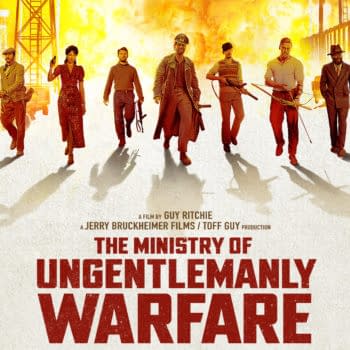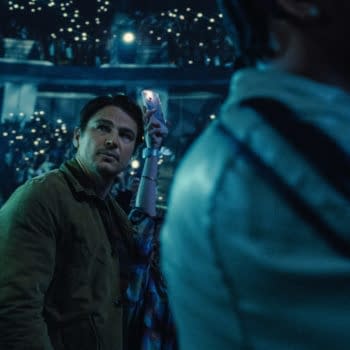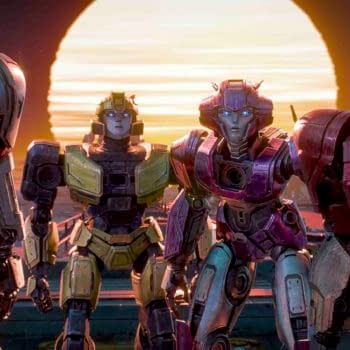Posted in: Movies, Recent Updates | Tagged: entertainment, film, indy filmmaking, production, Robin Hood Films, the Amazing Kreskin, The Matrix
Film Schooling: Insider Insights On Indy Filmmaking – Be Decisive In Production
By Chris Hood
(This is Part Sixteen of an ongoing series to help educate aspiring filmmaker on the process of making their first film. Previous articles in this series can be found at BleedingCool.com and MovieIndustry.com)
Parts: 1, 2, 3, 4, 5, 6, 7, 8, 9, 10, 11, 12, 13, 14, 15
A film set is an amalgam of unpredictability. It's an organized chaos. There's a randomness that's part serendipity and part Murphy's Law, yet despite copious amounts of the unexpected rearing its head, everything can still work out. Problems big and small make their way into every production. Most will require a decision to be made. An immediate decision. How quickly and how well it's chosen will dictate how successfully the dilemma is addressed. I obviously can't tell you how to successfully deal with every quandary that arises, but I can tell you how quickly to deal with it – immediately. Decisiveness can be one of your greatest qualities on a film set. If you don't have it, get it…fast. If your director doesn't have it, invest in a pair…and then invest in "a pair".
When I was directing my second film, The Casino Job, the Executive Producer came up to me during a break toward the end of the production and paid me a compliment I wasn't even sure was intended. He said to me, "I just can't believe how many decisions you have to make every single day and clearly most never crossed your mind before that moment and you make them on the spot. And they always seem to be right. It's amazing."
Well, it's certainly great that the guy funding the film felt I was the moviemaking equivalent of The Amazing Kreskin, and I certainly never dissuaded him from that belief (until now when he reads this article), but the fact was that I didn't always make the right decisions. My trick, the one that I learned serves me quite well, is to be decisive.
Be decisive and live with the consequences good or bad. Trust in yourself that you're going to get it right most of the time and that, when it really matters most, that you'll get it right almost all the time. We spoke earlier on the value of time and how every minute has a dollar value. That's rule one. So for every minute you waste, the film suffers. Don't think too much. You have months of planning before the cameras first role to think, rethink, plan, re-plan, plot and speculate how you might handle this or how that could play out. Once you're on set, there's scarce time to dwell.
This little caveat probably even applies more to the director than the producers, but as I usually do both, I can assure you it becomes doubly relevant when wearing both hats. No matter how much you plan and prepare, there will be literally hundreds (possibly thousands) of questions that you'll have to decide on the spot. Many, most in fact, won't be monumental. But answering questions is one of the main things you'll do. And many of those questions come in the form of problems that need to be solved. Solve them quickly because there's another one waiting right behind.
A producer and director should have a natural, inane ability to ingest these questions and immediately ascertain the importance they carry. In most cases, the responses won't be major and offer little to no room for disaster or regret even if the call isn't ideal.
When an actor is ten minutes late, what do you do? That's actually a trick question without a little more information. You need to know if someone has been in touch with that actor. If you know that actor is another ten minutes out, you'll be thinking along different lines than if no one has any idea where he or she is. In the case of the former, your options are limited and you'll likely have to wait or shoot around him/her. In the case of the latter, you need to be thinking worse case. Every permutation should come to you quickly so you can make the best decision possible. In a situation like this, you don't know if the actor is going to walk in five minutes from now, three hours late or simply not show up that day (for any number of reasons). Be decisive. You're decisions can be "We'll wait," for a few minutes, but if you're sitting around an hour later with that same mentality and still no idea where the actor is, you decided wrong.
People will almost certainly be late on your film. In some cases no one will have been in touch with them and this becomes a troubling problem. To wait for a person with no idea when they'll show is conceding to a variable that can fuck you and the production. What you should be thinking in a situation like this, though only you can decide if that's at the 5, 15, or 30 minute mark, is what do we do in the interim and what do we do if he/she doesn't show at all? Can the scene be reworked without the actor? Can that actor be replaced with someone else readily available? Can something else be shot while waiting for said actor to appear?
Naturally, you don't want to make major changes because an actor is a few minutes late, but it doesn't take long for "let's wait," to prove itself a bad decision. It's indecisive which is the one thing you don't want to be. Film sets are notorious for people sitting around waiting. Most cast and crew will spend most of their time on your set waiting around. The better prepared you are and the better your team, most importantly your First A.D., the less waiting that will be taking place. You'll never find that all departments and talent are ready at exactly the same time, but if you can consistently get it close, you've got yourself a good team and an effective production. But generally speaking, people will be waiting much of the time. If you ever have a time when everyone on set it waiting, you've probably done something wrong.
The late actor story is just one possible example of moments that can manifest themselves which require an immediate decision. And some producers and directors delay that decision for any number of reasons. One of the mantras of life that I live by is "A wrong decision is better than indecision every time." Make a call. Place the order. Stick your face in the fan and live to reap the consequences if you're wrong, but if you're any good, most of the time you won't be.
I do want to stress that there is one area where it is imperative that you take the extra time when needed and not rush a decision. Safety on set should be uncompromising. You're responsible for every soul on your project and it's your job to keep them safe. There may be times when a decision is necessary where safety is a primary or tertiary factor. Understand the gravity of these decisions in their entirety before making the call. In writing this, the recent death of a crewmember of the indy film Midnight Rider comes to mind. Although I don't know all the facts, the story being presented is that the production was shooting on a stretch of train track when a train came along, killing a camera operator on the film. Now, it's my understanding that the production had planned this in advance and was under the impression that no trains would be coming by during the time they were there. There were multiple bad decisions made in this example and the results were catastrophic. I use this as an example because I've been on a set where safety seemed to take a backseat to the pressures of meeting the schedule. I can easily imagine a film producer wanting to "steal a shot" on a nearby train track while waiting for an actor or because the shot list for the day has been met and some extra time is available. There are literally hundreds of scenarios like this where a decision is made quickly that could result in disaster. Don't be responsible for another cautionary tale.
Fortunately there are very few times when situations like this present themselves and, fortunately, fewer still when one person makes a bad call there isn't someone else there to step up and correct them. So, in short, your decisiveness needs to be peppered with common sense and concern from your team.
Despite all this wisdom, the sad fact is that as much I can instill the value of being decisive on a film set, there's nothing I can do to teach you common sense or humanity. So, please, if you don't have both of those, join a Fundamentalist church or go in to politics (respectively).
Chris Hood is a writer, producer and director of such films as "Counterpunch" starring Danny Trejo (a Lionsgate release) and "Dirty Dealing 3D" with Michael Madsen and C. Thomas Howell. He is also owner of Robin Hood Films, a Las Vegas-based distribution company representing English language films around the world and operates a film blog at MovieIndustry.com. He's also dead sexy. (Mr. Hood denies any involvement in the creation of this mini-bio.)
















